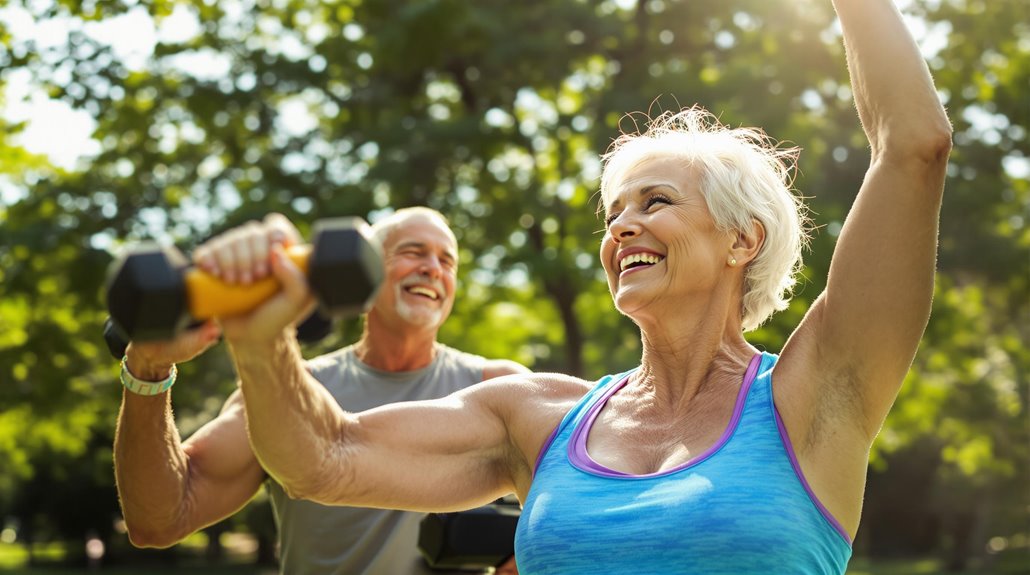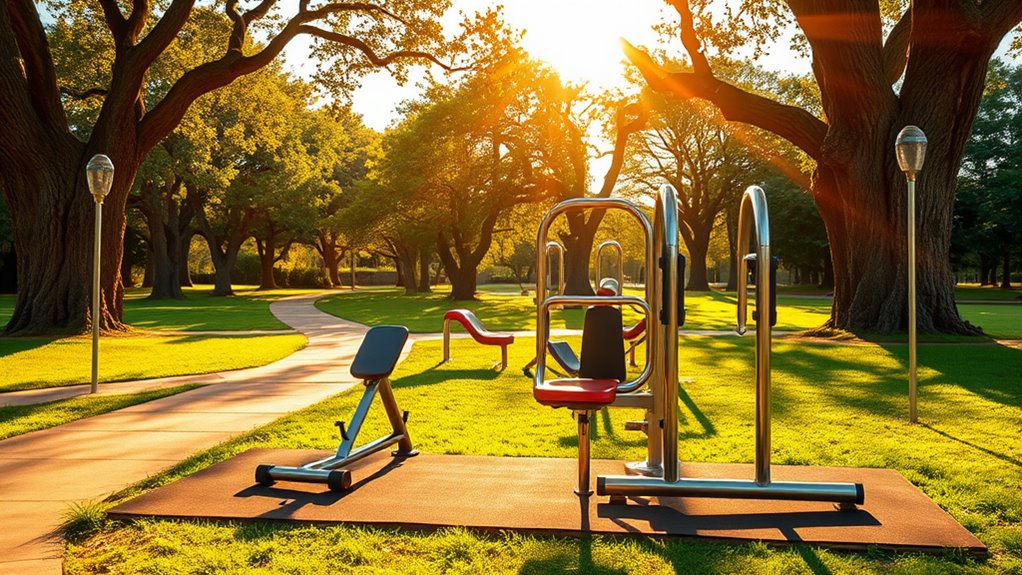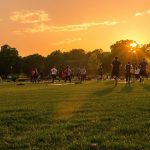
Exercise is essential for your well-being as a senior by helping prevent chronic diseases like heart disease and diabetes. It boosts your mental health by releasing endorphins to enhance your mood and decrease stress. Staying active improves physical function, maintaining muscle mass and joint flexibility while reducing fall risk. Exercise also supports cognitive health, keeping your memory sharp and potentially lowering dementia risk. Engaging in group activities fosters social connections, combating loneliness. With a diverse fitness plan, you enjoy a higher quality of life and maintain independence. Dive deeper into the countless ways exercise enriches your senior years.
Preventing Chronic Diseases
Regular exercise is a powerful tool in preventing chronic diseases. You’re not just moving your body; you’re harnessing a force that mitigates the risk of developing debilitating conditions.
Through strategic exercise types, like aerobic activities such as walking, swimming, and cycling, you fortify your heart and enhance cardiovascular health. These activities play an essential role in chronic disease management by reducing the risk of heart disease, stroke, and type 2 diabetes. Studies indicate a correlation between exercise and lower disease incidence. Consistent exercise also contributes to improved mood, enhancing your mental well-being alongside your physical health.
By incorporating strength training, you not only build but also maintain muscle mass, providing a buffer against age-related declines. This form of exercise supports chronic disease management by helping with conditions like arthritis and reducing stress on your joints.
Flexibility exercises, such as stretching, further aid chronic disease prevention by promoting joint mobility and reducing stiffness.
Balance exercises offer liberation from the fear of falls, enhancing your agility and coordination. They empower you, especially as you age, to embrace life with a greater sense of stability.
Enhancing Mental Health
Engaging in physical activity greatly boosts senior mental health by reducing anxiety, depression, and sleep disturbances. When you exercise regularly, your body releases endorphins, natural mood regulators that alleviate tension and enhance your overall emotional state. These hormones act as stress relief agents, leaving you feeling more liberated and in tune with your well-being. Furthermore, exercise boosts oxygen and blood flow to your brain, promoting growth and regeneration of cells, which enhances memory and cognitive control, giving you a mental edge. In fact, a comprehensive analysis of nearly 4,000 peer-reviewed articles underscores the profound impact of exercise on seniors’ mental health. Engaging in social connections and support during exercise can also further reduce stress and improve mental health. Embracing exercise also leads to improved sleep, essential for mental health. By stimulating your body, physical activity shifts you into a state of relaxation, increasing deep sleep cycles. This fosters better rest quality and duration, lifting your mood while banishing stress and fatigue.
| Benefit | Description |
|---|---|
| Mood Regulation | Releases endorphins to improve emotional state |
| Stress Relief | Reduces anxiety and eases tension |
| Enhanced Sleep Quality | Promotes deep sleep, reducing insomnia |
| Improved Cognitive Function | Boosts memory and cognitive control |
Group fitness classes add a social dimension, connecting you with others and combating loneliness. This camaraderie cultivates community spirit while further anchoring mental health, illustrating that the path to liberation and happiness is paved with movement.
Improving Physical Function

Start to invest in exercise, and you’ll soon notice remarkable improvements in your physical function. Regular strength training plays a significant role in muscle preservation, particularly for seniors facing the natural decline of muscle mass. As you engage in these exercises, you’re not just maintaining what’s already there, but actively preserving your strength, ensuring you stay vibrant and liberated in your daily life. Alongside muscle preservation, maintaining joint flexibility is essential. Engaging in regular physical activity keeps your joints supple, dramatically reducing the risk of arthritis and making everyday movements more effortless. Imagine a future free from the shackles of joint pain, where reaching for that top shelf or stepping over an obstacle becomes second nature. Exercise also plays an important role in maintaining balance and coordination, preventing those dreaded falls. Strengthening your body doesn’t just mean hefting heavier weights; it means confidently maneuvering the world around you without fear. Regular exercise is also beneficial for cognitive function, supporting memory and enhancing neuroplasticity, which contributes positively to brain health. Engaging in regular physical activity enhances cardiovascular health, which improves blood circulation and reduces risks related to heart health.
Boosting Immune Function
Through exercise, you can considerably boost your immune function, fostering a stronger body that’s less susceptible to illnesses. Embrace the opportunity to enhance your immune response by moderating exercise intensity to optimize health benefits.
Regular physical activity elevates natural killer and T cell activation through interleukin-15, paving the way for a robust defense against infections. This means a more vibrant life, liberated from the shackles of frequent illnesses. Exposure to natural light during outdoor activities can further enhance alertness and boost your mental clarity, complementing the immune benefits of exercise.
Aging may naturally diminish your immunity, but it doesn’t have to define you. Exercise revitalizes your immune system, delaying age-related decline. Even light exercises like walking and bicycling can be transformative, improving white blood cell circulation and early illness detection.
Consider integrating high-intensity interval training (HIIT) for sharp immune improvements in a shorter time. Staying active during the COVID-19 pandemic is crucial as it helps to maintain immune function and reduces the risk of chronic illnesses. Find joy in moderate exercise, whether golf or bodyweight routines, to reduce the risk of chronic diseases.
Notably, exercise mobilizes immune cells, heightening their surveillance and regulation, effectively managing inflammation and fortifying your body’s defenses.
Supporting Cognitive Health

When maintaining senior well-being, supporting cognitive health through exercise is essential. Regular physical activity offers liberation from the shackles of cognitive decline, with studies showing it can reduce your risk by up to 38%.
By embracing a routine that combines aerobic and strength training, you’ll amplify cognitive abilities, stimulating the brain in ways single-type exercises can’t. Don’t underestimate the neuroplasticity benefits that come with this commitment. Exercise triggers brain-derived neurotrophic factors, promoting both synaptic plasticity and memory retention.
Venturing into this active lifestyle opens your brain to incredible changes. Physical activity triggers neurogenesis and synaptogenesis, enhancing overall cognitive function. It boosts blood flow to your brain, delivering critical oxygen and nutrients, and increases the production of neurotransmitters like dopamine and serotonin. Regular exercise can improve overall well-being, making it an essential part of a senior’s lifestyle.
This not only counters age-related cognitive decline but also supports those living with dementia. Imagine adopting a mind-body exercise like Tai Chi, which can further refine your executive functions, sharpening selective attention and mental flexibility.
Crafting an exercise regimen that suits you is important—activities like walking and gardening aren’t only safe but enjoyable. Consultation with a healthcare provider guarantees your efforts maximize these liberating cognitive benefits.
Encouraging Social Engagement
Embracing an active lifestyle not only rejuvenates cognitive health but also strengthens social bonds that enhance senior well-being. Engaging in exercise isn’t just about the physical benefits – it’s a gateway to vibrancy in your social life.
By participating in group exercises, you’re not just working out; you’re fostering social connections that invigorate your spirit and sharpen your mind. These activities infuse a sense of community involvement, making exercise something you look forward to, rather than a chore.
Imagine meeting new friends while enjoying a brisk walk or a lively dance class. These social interactions release endorphins, improving your mood and reducing stress and anxiety.
Regularly engaging provides more than physical fitness; it combats loneliness and isolation, which can haunt those longing for liberation and a sense of belonging. Sharing a laugh and connected communication with peers uplifts your emotional health, enhancing overall well-being.
Social engagement through exercise encourages consistent participation. The enjoyable atmosphere and camaraderie motivate you to stick with these activities, boosting physical health and cognitive function.
Boosts Seniors’ Life Quality

Regular exercise serves as a cornerstone for enhancing the life quality of seniors, offering an extensive range of physical and mental health benefits. By incorporating physical activities into their daily routine, seniors can effectively fend off chronic diseases such as heart disease and diabetes, strengthening their bodies and fortifying their immune systems.
Exercise not only serves a preventive role but also boosts immediate and long-term wellness. It reinforces bones, improves balance, and accelerates healing, thereby notably reducing the risk of physical injury and promoting more robust overall health.
On a mental health front, the advantages of exercise are equally compelling. Regular physical activity is associated with improved cognitive function, helping to stave off dementia and cognitive decline. It acts as a natural mood enhancer, reducing symptoms of depression and anxiety while simultaneously fostering a sense of enhanced energy and liveliness.
Additionally, consistent exercise contributes to better sleep quality, fundamentally impacting seniors’ day-to-day life quality and reinforcing their mental and emotional well-being. By affecting both physical and mental domains, exercise helps seniors maintain independence and an active engagement with life.
The preventive care aspect of exercise can’t be overstated. It acts as a bulwark against bone degradation and chronic conditions, enhancing the overall quality of life and potentially contributing to a longer life expectancy.
Furthermore, by delaying the onset of age-related diseases, physical activity empowers seniors to enjoy their later years more fully. Practical recommendations suggest a balanced exercise regimen that includes endurance, strength, balance, and flexibility exercises.
Such a diversified fitness plan guarantees that seniors receive thorough health benefits, highlighting the importance of gradual progression to mitigate injury risk. By creatively engaging in these varied activities, seniors can build and maintain the physical strength and mental acuity necessary to lead fulfilling, active lives well into their later years.














